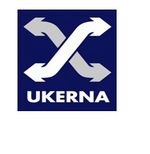United Kingdom Education and Research Networking Association
UKERNA (United Kingdom Education and Research Networking Association) is the trading name for JNT Association, a non-profit company funded by JISC to manage and develop the UK national research network backboneJANET, a computer network connecting the research and educational organizations in UK as well as the research and education networks in other Europe, United States and the Far East.[1] UKERNA is also known as JANET (UK).
 | |
| Type: | Non-Profit |
| Industry: | Internet |
| Founded: | 1994 |
| Founder(s): | Higher Education Funding Councils for England, Scotland & Wales, Office of Science & Technology |
| Headquarters: | JANET(UK), Lumen House, Library Avenue Harwell Oxford, Didcot, Oxfordshire OX11 0SG |
| Country: | UK |
| Website: | JA.net |
| LinkedIn: | UKERNA |
| Key People | |
| Tim Marshall, CEO | |
History
The establishment of UKERNA or Janet (UK) can be traced back to the Wells Report written by Professor Mike Wells.[2]
In 1970, the United Kingdom Computer Board commissioned Professor Mike Wells to lead the working parties to write a report about the situation of networking between the educational institutions in the country known as the Wells Report. In his report, Prof. Mike Wells made two recommendations. First, to create a national research network that would link the university computing centers. Second, the Computer Board should establish a small, full-time unit to coordinate and guide the organizations that are principal recipients of funds from the Department of Education and Science that are involved in the development of the network.
As a result of the Wells Report, the Network Unit was created on November 1, 1976 until October 31, 1978. It is a three member small, full time unit which visited and observed the 50 universities within UK to obtain a comprehensive view of the actual situation within the data communications and to understands the needs of users and service providers.
The Network Unit wrote reports recommending that all network development should be carried out by a full-time Joint Network Team (JNT), which was created in 1979. It was composed of six members: Roland Rosner, leader of the team, Barrie Charles, Les Clyne, Bob Cooper, Jim Craigie and Ken Heard. JNT was able to fund research on networking and became involved for instance in the development of protocols and protocol implementations in software and hardware.
In 1982, JNT achieved the first recommendation of the Wells Report to creat a national education and research network after the Science and Engineering Research Council (SERC) agreed to handover its own proprietary network, SERCnet to JNT for development into a full-blown national network connecting all universities and Research Councils. The network was named JANET which became operational in 1984 and it was managed by JNT which was funded partly by SERC and mainly by the Computer Board.
The Computer Board was dissolved on April 1, 1991 and became the Information Systems Committee (ISC) under the Universities Funding Council. Its primary role is to deal with networking and specialist information services. ISC assumed the funding responsibility for JANET and oversaw the creation of the new company, the JNT Association. On 1 April 1993, ISC became Joint Information Systems Committee (JISC).
JNT Association is a fully independent legal entity, publicly funded JISC. It was decided by JISC that JNT Association should not be able to own trademarks including its own name – that could conceivably be sold elsewhere so it officially traded as UKERNAOn June 7, 2007, UKERNA was changed to Janet(UK).